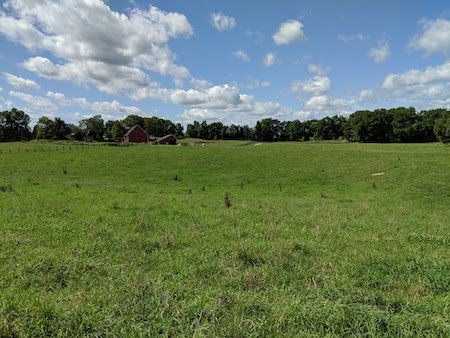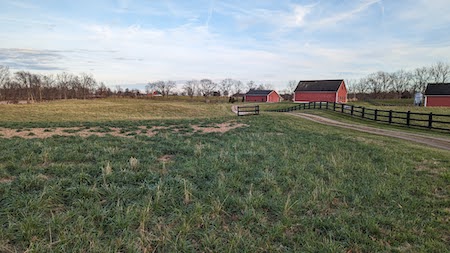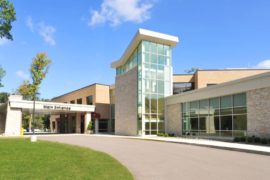WEBSTER TWP. – A 17-acre farm located in northern Washtenaw County and almost completely surrounded by other conserved farmland, is now permanently protected by Legacy Land Conservancy.
Amaizin’ Pop Farm, conserved thanks to the efforts of landowner Charlie Sing, consists of picturesque barns, idyllic rolling pasture fields, and prime agricultural soils. Situated northwest of Ann Arbor in an area heavily sought after for development, its protection through a conservation easement is vital to ensuring rich, productive soils are permanently protected and remain viable for agriculture now and in the future.
“I’m happy to do my part by protecting my farm from development,” Charlie said. “It helps out my fellow farmers, the community, and helps save a little more green space for the planet.”
Though small in size, Amaizin’ Pop Farm adds to the nearly 1,000-acre block of farmland in the area already conserved through a multi-partner regional effort. Legacy is grateful to work with partners like the City of Ann Arbor Greenbelt, Webster Township, and the Natural Resource Conservation Service (NRCS) who recognize the importance of conserving large blocks of farmland and helped to make conserving Amaizin’ Pop Farm possible.
“Context really matters for this parcel,” Rosie Pahl-Donaldson, Land Acquisition Supervisor of the Ann Arbor Greenbelt said. “It is a crucial piece of a larger conservation landscape, located in one of the most impressive blocks of contiguous protected land within the Greenbelt.”
By conserving smaller parcels of farmland–like Amaizin’ Pop Farm–within a larger protected area, it benefits farmers today as well as in the future. When conserved in close proximity to other farms, the tight-knit supportive farming community remains intact. And as farms change hands over time, small parcels are a good fit for farmers starting out or growing a new business.
Charlie is a retired genetics professor from the University of Michigan. He and his wife originally purchased the land in 1999. He is affectionately known as “Popcorn Charlie” in the community. Over the past 20 years he has used a portion of the land to breed improved strains of popcorn.
“I’ve been interested in corn farming most of my life,” Sing explained. “It’s in my soul.”

After successfully developing 13 novel strains of popcorn, he retired from the breeding business in 2022. His strains are used by the popcorn industry to produce the hybrid seeds that are used to grow the popcorn we eat. He currently keeps company with a small herd of beef cattle on his farm, and finds joy in sharing his life’s work with the community through educational events. Charlie will be part of an Ann Arbor District Library event–Culinary Historians: Popcorn as a Food, a Crop, and a Business–on March 24, 2024 from 4:00pm-5:30pm. He will explain the biology of the popcorn plant, describe his personal experiences developing hybrids, and outline how popcorn is grown, processed, and distributed to consumers. For event details check out the Ann Arbor District Library event page >>> https://aadl.org/node/624668
“In a time when farmland is being developed at an alarming rate, Legacy’s work to protect farms is crucial,” Diana Kern Executive Director said. “We are extremely proud to work with famers like Charlie who recognize the importance of protecting farms and feel a strong sense of duty to keep their community’s agricultural heritage alive.”
To purchase the Amaizin’ Pop Farm conservation easement, Legacy worked over four years to secure a myriad of funding through the City of Ann Arbor Greenbelt, Webster Township, the Washtenaw County Parks & Recreation Commission (WCPARC), the Natural Resource Conservation Service (NRCS), and other private entities.
About Legacy Land Conservancy: Founded in 1971 as Michigan’s first local land trust, Legacy is a nonprofit conservation organization that protects land in southern Michigan. Legacy’s mission is to secure for current and future generations a land base for nature, agriculture, fresh water, and recreation in Jackson and Washtenaw counties and beyond. Legacy has helped to protect more than 10,000 acres of land (including seven nature preserves open for all to enjoy) that enhance our community’s quality of place by safeguarding water quality, conserving working farms, and protecting places to play. In a testament to over 50 years of successful voluntary conservation, Legacy is accredited by the Land Trust Accreditation Commission for adhering to a set of standards designed to ensure the organization’s work will endure forever. Legacy is based in Ann Arbor, Michigan. For more information, visit www.legacylandconservancy.org.
About U.S. Department of Agriculture Natural Resources Conservation Service (NRCS): For more than 80 years, NRCS and its predecessor agencies have worked in close partnerships with farmers and ranchers, local and state governments, and other federal agencies to maintain healthy and productive working landscapes by delivering conservation solutions. Through financial and technical assistance programs, NRCS helps America’s farmers, ranchers and forest landowners conserve the nation’s soil, water, air and other natural resources benefiting both the landowner and the environment. For more information, visit https://www.nrcs.usda.gov/programs-initiatives/ale-agricultural-land-easements
About Ann Arbor Greenbelt (Greenbelt): The City of Ann Arbor Greenbelt Program has protected more than 7,600 acres of farmland and open space surrounding the city of Ann Arbor. It is funded by the Open Space and Parkland Preservation Millage, a 30-year millage approved by Ann Arbor voters in 2003. The Greenbelt Program protects land by purchasing the development rights on properties within the Greenbelt district, which is made up of portions of eight townships surrounding the city, and by partnering with Washtenaw County and other local partners to purchase natural areas for public nature preserves.
About Webster Township Farmland & Open Space Preservation Board: The Webster Township Farmland and Preservation Board, also known as the PDR Board, is comprised of 5 members appointed by the Township Board. It is supported by a land services Consultant. The preservation board meets monthly in order to review applications and make recommendations to the Township Board regarding dedicated PDR fund expenditures. Webster Township’s land preservation program is funded by a dedicated millage which voters passed initially in 2005 and renewed twice. The Township program has been involved in protecting over 2,700 acres.



